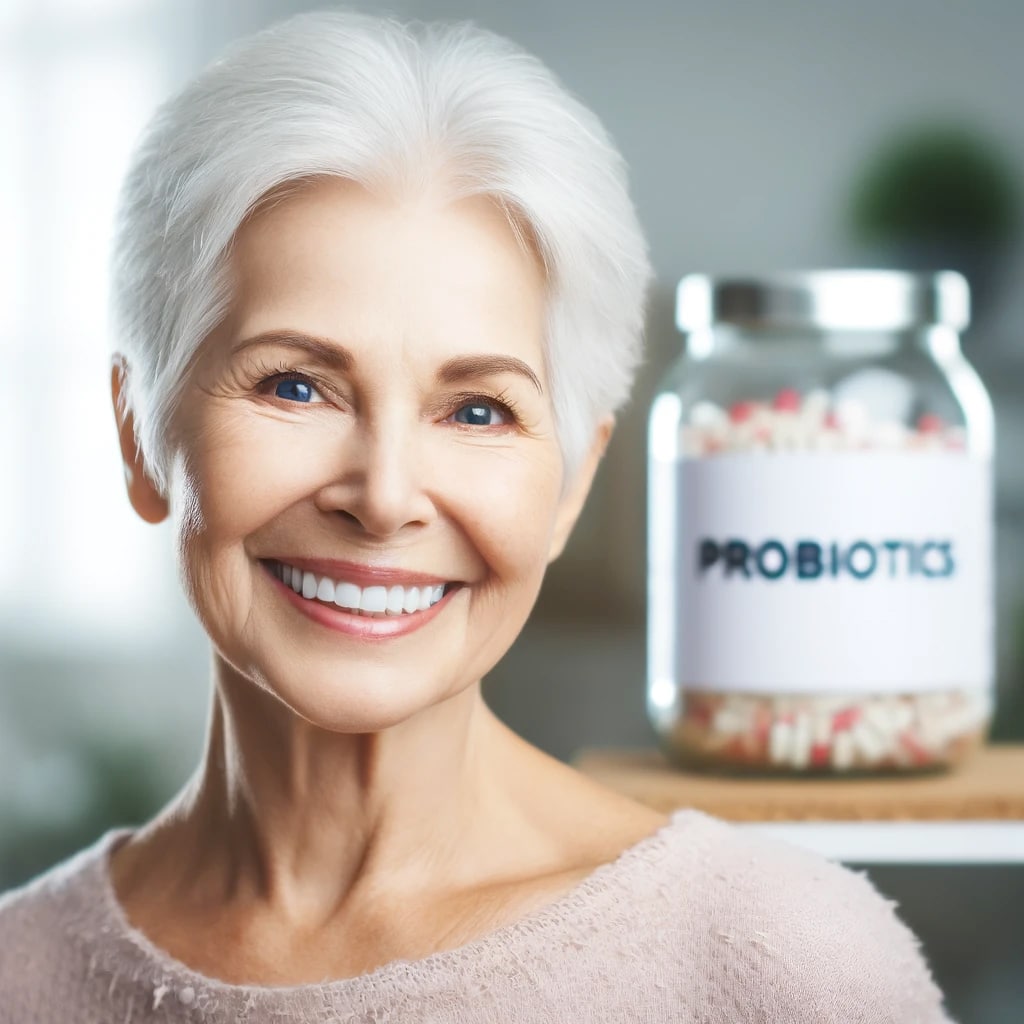In the golden years of life, maintaining optimal health becomes a top priority, and oral health is no exception. For seniors, oral health is crucial, not only for comfort and aesthetics but also because it’s closely linked to overall health. Emerging research suggests that probiotics, often hailed for their gastrointestinal benefits, could play a pivotal role in enhancing oral health as well.
This article delves into how integrating probiotics into daily routines can bolster oral health for seniors, shedding light on a less explored facet of these beneficial bacteria.
The Power of Probiotics in Oral Health
At first glance, probiotics and oral health may seem unrelated. Probiotics are live bacteria and yeasts that are good for your health, especially your digestive system. However, the oral cavity is part of the digestive tract and provides an environment where beneficial bacteria can thrive, contributing to health and well-being. Interestingly, the mouth houses over 700 species of bacteria, some of which are beneficial and others that can be harmful if they outnumber the good ones.
Studies have shown that probiotics can help balance the oral microbiome, reducing the prevalence of harmful bacteria that lead to common dental issues like cavities, gum disease, and bad breath. For example, a study published in the Journal of Oral Microbiology highlighted that certain strains of Lactobacillus reuteri can significantly reduce the presence of Streptococcus mutans, a primary culprit behind tooth decay.
A Closer Look at Probiotic Benefits for Seniors’ Oral Health
Delving deeper into the beneficial role of probiotics for seniors’ oral health unveils a compelling narrative supported by scientific research, personal experiences from those who have seen significant improvements, and insights from dental health experts. The intricate relationship between oral health and probiotics reflects a growing recognition of holistic health approaches, especially in addressing the unique needs of the senior population.
Combating Gum Disease with Probiotics
Periodontal disease, characterized by inflamed and bleeding gums, is a prevalent issue among seniors, often leading to tooth loss and impacting overall quality of life. The study in the Journal of Clinical Periodontology highlighting the benefits of Lactobacillus reuteri is just the tip of the iceberg. Dr. Samantha Jones, a dental researcher with over two decades of experience, shares an illuminating perspective: “The oral microbiome is an ecosystem. By introducing beneficial bacteria through probiotics, we’re essentially fortifying the natural defenses against pathogenic bacteria responsible for gum disease.” She further elaborates on a 2016 study where seniors with periodontitis showed significant improvement in gum health after consuming probiotic milk containing Lactobacillus rhamnosus SP1.
Personal anecdotes add color to these findings. George, a 72-year-old retiree, began taking a daily probiotic supplement as part of his oral health routine. Within months, he noticed less gum bleeding during brushing, a common symptom of gum disease. “It was remarkable,” he shares. “My dentist was impressed by the improvement in my gum health at my next check-up.”
Reducing the Risk of Oral Candidiasis
Oral candidiasis, or thrush, presents a frustrating challenge for many seniors, manifesting as painful, white lesions in the mouth. Traditional treatments include antifungal medications, which can have side effects or lead to resistance. Enter probiotics, offering a novel preventative approach. A study cited in the International Journal of Oral Science demonstrated that probiotics, particularly Lactobacillus strains, can significantly inhibit the growth of Candida albicans, the fungus responsible for thrush. This is attributed to the competitive inhibition where probiotics occupy space and resources, leaving less room for harmful fungi to grow.
Expert opinion from Dr. Emily Clark, a specialist in geriatric dentistry, underscores this point: “Probiotics are a game-changer for seniors struggling with recurrent oral thrush. They not only help in managing the symptoms but also, more importantly, in preventing the onset of the infection.”
Fighting Bad Breath Through Microbiome Balance
Halitosis, or chronic bad breath, often stems from deeper issues within the oral microbiome. The imbalance between beneficial and harmful bacteria can lead to the proliferation of odor-causing species. Probiotics offer a natural solution by introducing strains that can outcompete these harmful bacteria. Anecdotal evidence from Martha, a 65-year-old yoga instructor, illustrates this: “After starting a probiotic regimen, I noticed a significant improvement in my breath. It’s more than just oral hygiene; it’s about balance.”
Enhancing Digestive Health for Oral Wellness
The connection between digestive health and oral health is profound, with issues like acid reflux exacerbating or even causing dental problems by eroding enamel. Probiotics’ role in promoting gut health, thereby reducing instances of reflux, showcases their indirect benefit to oral health. Dr. Henry Talbot, a gastroenterologist with a focus on senior health, explains, “A healthy gut microbiome is essential for overall health, including oral health. Probiotics can significantly reduce symptoms of GERD (Gastroesophageal Reflux Disease), a common ailment in seniors, thereby protecting teeth from acid damage.”
| Probiotic Strain | Benefit | Source |
|---|---|---|
| Lactobacillus reuteri | Reduces gum inflammation and plaque | Fermented dairy products, supplements |
| Lactobacillus rhamnosus | Decreases the occurrence of cavities | Yogurt, cheese, supplements |
| Bifidobacterium lactis | Improves gum health, reduces soreness | Milk, fermented foods, supplements |
| Streptococcus salivarius | Targets and neutralizes bad breath bacteria | Mouthwashes, lozenges, supplements |
| Saccharomyces cerevisiae | Enhances immune defense against oral pathogens | Brewer’s yeast, supplements |
Incorporating Probiotics into Your Oral Health Routine
Integrating probiotics into one’s daily oral health routine marks a strategic move towards enhancing overall dental well-being, particularly for seniors. The synergy between understanding the benefits of probiotics and applying this knowledge effectively can lead to remarkable improvements in oral health. Here’s a closer dive into practical strategies for incorporating these beneficial bacteria into your oral care regimen:
Selecting the Optimal Probiotic Strains
The journey to bolstering oral health with probiotics begins with identifying the most effective strains. Not all probiotics offer the same benefits, making it crucial to select ones that target oral health specifically. Strains such as Lactobacillus reuteri, Lactobacillus rhamnosus, and Bifidobacterium have been the subject of extensive research, demonstrating significant positive impacts on oral health conditions. These strains are known for their ability to combat harmful bacteria, reduce inflammation, and support a balanced oral microbiome.
Dental health experts emphasize the importance of this selection process. Dr. Laura Hernandez, a respected figure in dental microbiology, states, “Choosing the right probiotic strains is akin to selecting the best medicine for a disease. For oral health, strains like Lactobacillus reuteri not only help in managing gum diseases but also play a pivotal role in preventing them.”
Diversifying Probiotic Sources
Diversity is key when it comes to probiotics. Incorporating a variety of sources into your diet not only ensures a broader spectrum of benefits but also caters to personal preferences and lifestyles. Probiotic supplements offer a direct and concentrated source of beneficial bacteria, while fermented foods such as yogurt, kefir, sauerkraut, and miso provide a natural and delicious alternative. Additionally, the market has seen an influx of specialized oral health products, including probiotic-enriched toothpaste and mouthwash, designed specifically to target the oral microbiome.
Anecdotes from those who have diversified their probiotic sources reflect positive outcomes. Margaret, a 68-year-old retiree, shares, “Incorporating yogurt into my breakfast routine and using a probiotic toothpaste has not only improved my oral health but has also enhanced my overall sense of well-being.”
Emphasizing Consistency in Probiotic Use
The benefits of probiotics, while compelling, are not instantaneous. They require consistent use over time to see a tangible impact. Regular consumption or use helps maintain a steady level of beneficial bacteria, promoting a balanced and healthy oral microbiome. This consistency is critical in outcompeting harmful bacteria and maintaining oral health improvements.
Reflecting on the importance of consistency, George, who experienced significant improvements in gum health, advises, “Stick with it. It took a few months to notice the changes, but it was absolutely worth the commitment.”
Consulting Healthcare Providers
Before embarking on a new probiotic regimen, consulting with healthcare providers is essential. This step is especially crucial for seniors who may have pre-existing conditions or be on medications that could interact with probiotics. Healthcare professionals can offer personalized advice, ensuring that probiotic use is safe and effective.
Dr. Sophia Lee, a gerontologist, underscores this advice: “I always recommend a discussion with your healthcare provider before starting any new supplement, including probiotics. It’s about ensuring it’s the right choice for your health profile.”
Enhancing Dental Health through Probiotic Solutions
The Probiotic Pathway to Stronger Teeth and Gums
The foundation of oral health lies in the strength and integrity of teeth and gums, areas where probiotics have shown remarkable efficacy. The introduction of beneficial bacteria into the oral cavity through probiotics supports a balanced microbiome, which is essential for the prevention of common dental issues such as tooth decay and gum disease. A balanced oral microbiome acts as a formidable barrier against pathogenic bacteria, thwarting their ability to cause harm.
Dr. Anne Richardson, a pioneer in dental probiotic research, sheds light on this mechanism: “Probiotics work by colonizing the oral cavity, creating a protective shield against harmful bacteria that contribute to tooth decay and gum disease. This not only helps in maintaining strong teeth and healthy gums but also mitigates the risk of more serious conditions linked to oral pathogens.”
The Fresh Breath Formula with Probiotics
Halitosis, or chronic bad breath, is a concern that significantly impacts social interactions and self-esteem. The root cause of bad breath often lies deeper than the surface, linked to the activities of harmful bacteria in the oral microbiome. Probiotics offer a natural and effective solution by introducing beneficial bacteria that compete with and neutralize the odor-causing microbes. This action not only addresses the symptoms of bad breath but also targets its underlying causes, promoting a fresher, cleaner oral environment.
Personal testimonies echo the scientific findings. Linda, a 70-year-old who struggled with persistent bad breath, found relief after incorporating probiotic-rich yogurt into her diet and using probiotic oral care products. “It was a game-changer,” she reflects. “I feel more confident in my interactions, and it’s all thanks to a simple adjustment in my oral care routine.”
A Natural Defense Against Oral Infections
Seniors are particularly vulnerable to oral infections such as oral candidiasis, commonly known as thrush. This condition can be both uncomfortable and detrimental to overall health. Probiotics emerge as a potent ally in this battle, bolstering the oral immune system and creating conditions that are inhospitable to the fungi and bacteria responsible for such infections. Through the regular incorporation of probiotics, seniors can enhance their natural defenses, reducing the incidence and severity of oral infections.
The role of probiotics in preventing oral infections is not just anecdotal; it is backed by scientific research demonstrating their effectiveness in enhancing the body’s natural defenses. This preventative strategy underscores the importance of a proactive approach to oral health, particularly in the senior years.
A Holistic Approach to Oral Wellness
The integration of probiotics into oral health routines represents a forward-thinking approach to dental care, especially pertinent for seniors. This strategy aligns with a broader understanding of health that recognizes the interconnectedness of the body’s various systems. Probiotics, while traditionally associated with gut health, offer substantial benefits for oral wellness, highlighting the role of a balanced microbiome in maintaining and enhancing overall health.
As ongoing research continues to illuminate the benefits of probiotics, their incorporation into daily oral care routines stands out as a promising, natural, and effective strategy for enhancing oral health among seniors. Through diet, supplements, and specialized oral care products, probiotics provide a comprehensive approach to a healthier mouth, setting the stage for improved quality of life in the senior years.
Boosting Oral Health with Probiotics: Your FAQs Answered
What are probiotics?
Probiotics are live microorganisms, primarily bacteria, that are beneficial to health, especially the digestive system. They can also positively affect oral health when present in the mouth.
How do probiotics benefit oral health?
Probiotics help balance the oral microbiome, reducing harmful bacteria that cause gum disease, cavities, and bad breath. They can also enhance the immune system’s response to oral pathogens.
Can probiotics cure gum disease?
While probiotics cannot cure gum disease on their own, they can significantly support gum health by reducing inflammation and the presence of harmful bacteria. They are best used as part of a comprehensive oral care routine.
Are there specific probiotic strains that are best for oral health?
Yes, specific strains such as Lactobacillus reuteri, Lactobacillus rhamnosus, and Bifidobacterium lactis have been studied for their oral health benefits, including improving gum health and reducing cavities.
How can seniors incorporate probiotics into their oral health routine?
Seniors can incorporate probiotics through dietary sources like yogurt and fermented foods, supplements, and oral care products like probiotic toothpaste and mouthwash.
Are probiotics safe for everyone?
Probiotics are generally considered safe for most people. However, individuals with compromised immune systems or severe illnesses should consult their healthcare provider before starting probiotics.
How long does it take to see benefits from using probiotics?
The benefits of using probiotics can vary; some people may notice improvements in a few weeks, while for others, it might take a few months. Consistency is key.
Can probiotics replace traditional oral care routines?
No, probiotics should be used as a supplement to, not a replacement for, traditional oral care routines like brushing, flossing, and regular dental check-ups.
Do probiotic supplements have the same effect as food-based probiotics?
Both supplements and food-based probiotics can be effective. The best choice depends on personal preference, lifestyle, and specific oral health needs.
Can using probiotic oral care products lead to an overgrowth of bacteria in the mouth?
When used as directed, probiotic oral care products are unlikely to cause an overgrowth of bacteria. They are designed to balance the oral microbiome, not overwhelm it with beneficial bacteria.
References
- “Probiotics in Oral Health and Disease: A Systematic Review” by Perrine Saïz, Nuno Taveira, and Ricardo Alves. This review assesses the benefits of probiotics in oral health and disease, and in dental practice.
- “The Effect of Probiotics on Health Outcomes in the Elderly: A Systematic Review of Randomized, Placebo-Controlled Studies” by Ashley N. Hutchinson, Cecilia Bergh, Kirsten Kruger, Martina Sűsserová, Jessica Allen, Sophie Améen, and Lina Tingö. This systematic review discusses the effect of probiotics on health outcomes in healthy older adults.
- “Efficacy and Safety of Probiotics in Geriatric Patients with Constipation”. This study assesses the efficacy and safety of probiotics in managing constipation among the elderly.








